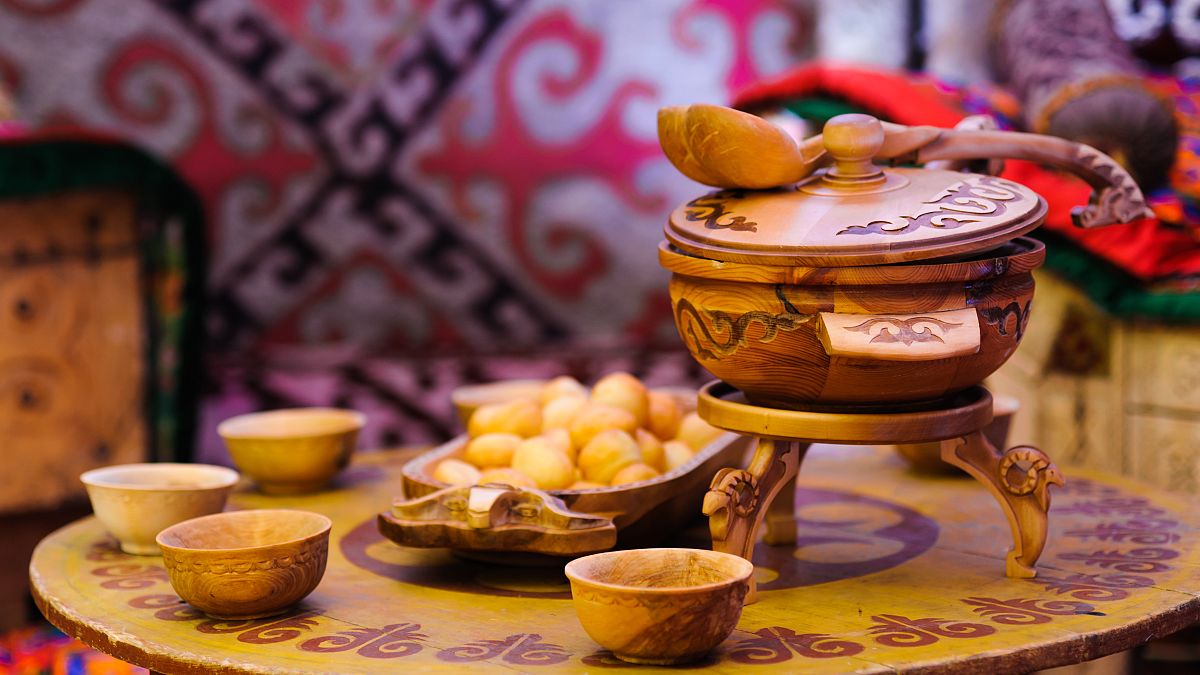Traditionally an under-explored destination for international travellers, Kazakhstan offers adventurous visitors plenty of culture, snow-capped mountains, and show-stopping architecture.
Sharing a border with Russia in the north, China in the east and Kyrgyzstan in the south, its cultural heritage is as diverse as its geography. Influences from nomadic traditions, Islamic culture, and Soviet-era history have helped shape its identity.
The country's capital, Astana, symbolises Kazakhstan's ambitious aspirations and contemporary development. With its futuristic skyline, gleaming skyscrapers, and avant-garde architecture, Astana is a testament to Kazakhstan's emergence as a regional economic powerhouse.
Tradition is still an essential part of the country, and the Kazakh people, known for their warmth and hospitality, take pride in their nomadic heritage. It is reflected in their customs and evolving cuisine.
This landlocked country has a burgeoning food scene enriched by its nomadic traditions. Here, Silk Road heritage is blended with innovative, modern twists.
Dishes largely reflect traditional, nomadic foods eaten by tribes roaming the harsh environment of the steppes. This cuisine has long consisted of staples like meat, dough, and onion but is now slowly evolving and modernising while retaining authentic Kazakh elements.
Does Kazakhstan have the ‘most underrated cuisine in the world’?
"I'm probably convinced that Kazakh is the most underrated cuisine in the world," says Kairat Sadvakassov, Chairman of the Board of Kazakh Tourism.
Outside the country, Kazakh dishes and specialities still need to be discovered on the world culinary stage.
Cultural oppression during the Soviet era and a lack of migration prevented it from spreading and evolving as the focus was on "sustaining our own culture," explains Sadvakassov.
"We were left with really traditional food, which was, probably, at the level of what our ancestors ate hundreds of years ago…loads of protein, lots of meat," he adds.
Despite a period of stagnation, Kazakh cuisine is having a moment right now with attempts to revive dishes by adding a modern twist.
Known as 'Neo Nomad cuisine', this contemporary reinterpretation of traditional dishes celebrates the country’s culinary heritage while embracing modern techniques and unique flavours.
Neo Nomad chefs draw inspiration from local ingredients and traditions, infusing classic dishes with innovative twists and creative presentations.
Kazakhstan’s restaurants are receiving international recognition
This newfound focus on Kazakhstan's burgeoning food scene is starting to garner international recognition. The New York Times recently included Almaty in its prestigious '52 Places to Go in 2024' list.
Author and photographer Craig Mod notes that Almaty's diverse food scene underscores its status as a cultural hub. Mod writes that Neo-nomad cuisine, focused on flour, water, and meat, takes centre stage in hyper-contemporary establishments such as Auyl and Tör.
"Cuisine from northwest China is on offer at Lanzhou Noodle and great coffee at Sensilyo Coffee or JumpinGoat. Gaze upon the patchwork quilt of fruits and nuts splayed out at the Green Bazaar – and then try PlatformA, a large food hall that recently opened inside a Soviet Modernist building," Mod adds.
In Kazakhstan's capital, Astana, you can visit the famous Qazaq Gourmet restaurant, recognised in the '50 Best Discovery List'.
"This event marks a significant acknowledgement of Kazakh national cuisine and Kazakhstan's gastronomic industry on the global stage,” says Sadvakassov.
This accolade cements Almaty's position as a stalwart of Kazakhstan's flourishing tourism scene, offering travellers a rich, multi-layered experience with exciting culinary innovations.
Five must-try dishes from Kazakhstan
Ready to explore Kazakhstan's gastronomic scene? Here are dishes you need to try when visiting this Central Asian gem.
Beshbarmak: A culinary icon of nomadic heritage
Beshbarmak translates to "five fingers" in Kazakh because nomads traditionally eat this dish with their hands. It's a hearty and satisfying meal that embodies the country’s nomadic heritage, resilience and respect for livestock.
Beshbarmak typically features tender pieces of boiled meat, traditionally lamb or horse meat, served atop a bed of wide noodles.
The dish is often accompanied by thinly sliced onions and flavorful broth, making it a satisfying option for hungry travellers.
Plov: A fusion of rice and spice
Plov, also known as pilaf, is a beloved national dish that reflects Kazakhstan's multicultural heritage and culinary diversity.
This fragrant rice dish is cooked with tender meat, often lamb or beef, and aromatic spices, including cumin, coriander, and garlic.
Carrots, onions, and sometimes dried fruits add flavour and complexity to the dish. Plov is a staple at weddings, celebrations, and family gatherings, where it symbolises abundance, prosperity, and the joys of communal dining.
Manty: Savoury dumplings with a Kazakhstan twist
Manty dumplings are a popular street food and comfort dish in Kazakhstan.
These oversized dumplings are typically filled with minced lamb or beef, onions, and fragrant spices and then steamed to perfection.
The dough is thick and hearty, providing the perfect vessel for the tender meat filling.
Dumplings are often served with a dollop of sour cream or a spicy tomato-based sauce, adding a tangy contrast to the rich and savoury filling.
Shashlik: Grilled delights straight from the barbecue
Shashlik, skewered and grilled meat, is a favourite dish in Kazakhstan - especially during summer when outdoor gatherings and barbecues are in full swing.
Marinated lamb, beef, or chicken cubes are threaded onto skewers and then grilled over an open flame until tender and juicy.
The marinade, typically a mixture of vinegar, onions, and spices, infuses the meat with bold and zesty flavours, while the smoky char from the grill adds depth and complexity.
Shashlik is often served with flatbread, grilled vegetables, and a tangy yoghurt sauce.
Baursak: A sweet and savoury treat
Baursak, small balls of fried dough, are a traditional Kazakh snack enjoyed throughout the day.
These golden-brown nuggets are crispy on the outside and soft and fluffy on the inside. Their hint of sweetness pairs perfectly with savoury dishes.
Baursak is often served with tea or as a side dish to accompany main meals. It provides a satisfying crunch and burst of flavour for adventurous eaters.


